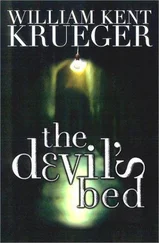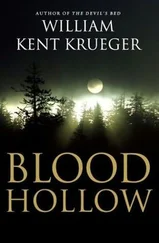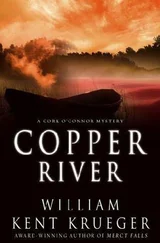William Krueger - Ordinary Grace
Здесь есть возможность читать онлайн «William Krueger - Ordinary Grace» весь текст электронной книги совершенно бесплатно (целиком полную версию без сокращений). В некоторых случаях можно слушать аудио, скачать через торрент в формате fb2 и присутствует краткое содержание. Жанр: Триллер, на английском языке. Описание произведения, (предисловие) а так же отзывы посетителей доступны на портале библиотеки ЛибКат.
- Название:Ordinary Grace
- Автор:
- Жанр:
- Год:неизвестен
- ISBN:нет данных
- Рейтинг книги:4 / 5. Голосов: 1
-
Избранное:Добавить в избранное
- Отзывы:
-
Ваша оценка:
- 80
- 1
- 2
- 3
- 4
- 5
Ordinary Grace: краткое содержание, описание и аннотация
Предлагаем к чтению аннотацию, описание, краткое содержание или предисловие (зависит от того, что написал сам автор книги «Ordinary Grace»). Если вы не нашли необходимую информацию о книге — напишите в комментариях, мы постараемся отыскать её.
Ordinary Grace — читать онлайн бесплатно полную книгу (весь текст) целиком
Ниже представлен текст книги, разбитый по страницам. Система сохранения места последней прочитанной страницы, позволяет с удобством читать онлайн бесплатно книгу «Ordinary Grace», без необходимости каждый раз заново искать на чём Вы остановились. Поставьте закладку, и сможете в любой момент перейти на страницу, на которой закончили чтение.
Интервал:
Закладка:
William Kent Krueger
Ordinary Grace
The heart has reasons that reason does not understand.
— Blaise PascalPrologue
All the dying that summer began with the death of a child, a boy with golden hair and thick glasses, killed on the railroad tracks outside New Bremen, Minnesota, sliced into pieces by a thousand tons of steel speeding across the prairie toward South Dakota. His name was Bobby Cole. He was a sweet-looking kid and by that I mean he had eyes that seemed full of dreaming and he wore a half smile as if he was just about to understand something you’d spent an hour trying to explain. I should have known him better, been a better friend. He lived not far from my house and we were the same age. But he was two years behind me in school and might have been held back even more except for the kindness of certain teachers. He was a small kid, a simple child, no match at all for the diesel-fed drive of a Union Pacific locomotive.
It was a summer in which death, in visitation, assumed many forms. Accident. Nature. Suicide. Murder. You might think I remember that summer as tragic and I do but not completely so. My father used to quote the Greek playwright Aeschylus. “He who learns must suffer. And even in our sleep pain, which cannot forget, falls drop by drop upon the heart, until, in our own despair, against our will, comes wisdom through the awful grace of God.”
In the end maybe that’s what the summer was about. I was no older than Bobby and didn’t understand such things then. I’ve come four decades since but I’m not sure that even now I fully understand. I still spend a lot of time thinking about the events of that summer. About the terrible price of wisdom. The awful grace of God.
1
Moonlight pooled on the bedroom floor. Outside the chirr of crickets and other night bugs gave life to the dark. It was not yet July but already hot as blazes. That may have been why I was awake. In 1961 no one but the rich in New Bremen had air-conditioning. During the day most folks battled the heat by closing their curtains against the sun and at night fans drew in the promise of cooler air. In our house there were only two fans and neither was in the bedroom I shared with my brother.
As I tossed about on top of the sheet trying to get comfortable in the heat the telephone rang. My father often said that nothing good came of phone calls in the middle of the night. He answered them anyway. I figured it was simply another part of his job, another part of all the things my mother hated about what he did. The telephone sat on a small table in the hallway outside my room. I stared at the ceiling and listened to the brittle ring until the hall light came on.
“Yes?”
Across the room Jake shifted in his bed and I heard the frame squeak.
My father said, “Any damage?” Then he said, tired and polite, “I’ll be there in a few minutes. Thank you, Cleve.”
I was out of bed and trotting into the hallway before he hung up. His hair was wild from sleep, his cheeks shadowed blue with stubble. His eyes were weary and sad. He wore a T-shirt and striped boxer shorts.
“Go back to sleep, Frank,” he told me.
“I can’t,” I said. “It’s too hot and I’m already awake. Who was it?”
“A police officer.”
“Is somebody hurt?”
“No.” He closed his eyes and put the tips of his fingers against his lids and rubbed. “It’s Gus.”
“He’s drunk?”
He nodded and yawned.
“In jail?”
“Go back to bed.”
“Can I go with you?”
“I told you, go back to bed.”
“Please. I won’t be in the way. And I can’t sleep now anyway.”
“Keep your voice down. You’ll wake everybody.”
“Please, Dad.”
He had energy enough to rise and meet his duty but not the strength to blunt the assault of a thirteen-year-old looking for adventure in the middle of an oppressive summer night. He said, “Get dressed.”
Jake was sitting on the edge of his bed. He already had his shorts on and was pulling up his socks.
I said, “Where do you think you’re going?”
“With you and Dad.” He knelt and in the dark under his bed dug for his sneakers.
“Like hell.”
“You said hell,” he said, still digging.
“You’re not going, Howdy Doody.”
He was younger than me by two years and two heads shorter. Because he had red hair and freckles and freakish ears that stood out like the handles on a sugar bowl people in New Bremen sometimes called him Howdy Doody. When I was pissed at him I called him Howdy Doody too.
“You’re not the b-b-b-boss of me,” he said.
Jake almost always stuttered in public but around me he only stuttered when he was mad or scared.
“No,” I replied, “but I can p-p-p-pound the crap out of you any time I want.”
He found his sneakers and began to put them on.
Night was the dark of the soul and being up in an hour when the rest of the world was dead with sleep gave me a sinful thrill. My father often ventured out like this on some lonely mission but I’d never been allowed to go. This was special and I didn’t want to share it with Jake. I’d already wasted precious time however so I left off arguing and got myself dressed.
My brother was waiting in the hall when I came out. I intended to argue with him some more but my father slipped from his bedroom and shut the door behind him. He looked at Jake as if about to say something unpleasant. Instead he sighed and signaled us both to go before him down the stairs.
Outside the crickets were kicking up a frenzy. Fireflies hung in the still black air flickering on and off like the slow blink of dreamy eyes. As we walked to the garage our shadows glided before us, black boats on a silver sea of moonlight.
“Shotgun,” Jake said.
“Ah, come on. You’re not even supposed to be here.”
“I called it.”
Which was the rule. In New Bremen, a town platted and populated by Germans, rules were abided by. Even so I complained until my father broke in. “Jake called it,” he said. “End of discussion, Frank.”
We piled into the car, a 1955 Packard Clipper the color of canned peas that my mother had named Lizzie. She christened every automobile we ever owned. A Studebaker she called Zelda. A Pontiac Star Chief was Little Lulu after the comic book character. There were others but her favorite-the favorite of us all except my father-was that Packard. It was huge and powerful and elegant. It had been a gift from my grandfather and was a source of contention between my parents. Though he never came right out and said so I believe it hurt my father’s pride to accept such an extravagant gift from a man he didn’t particularly like and whose values he openly challenged. I understood even then that my grandfather considered my father a failure and not good enough for my mother. Dinner when these two sat at the same table was usually a storm about to break.
We pulled out and drove through the Flats which was what we called the part of New Bremen where we lived. It lay along the Minnesota River below the Heights where the wealthy families resided. There were a lot of people living above us who weren’t rich but no one with money lived on the Flats. We drove past Bobby Cole’s house. Like all the others we passed it was totally dark. I tried to wrap my thinking around the fact of his death which had occurred the day before. I’d never known a kid who died and it felt unnatural and sinister, as if Bobby Cole had been snatched by a monster.
“Is Gus in t-t-trouble?” Jake asked.
“Some but not serious,” my father replied.
“He didn’t bust up anything?”
“Not this time. He got into a fight with another fellow.”
Читать дальшеИнтервал:
Закладка:
Похожие книги на «Ordinary Grace»
Представляем Вашему вниманию похожие книги на «Ordinary Grace» списком для выбора. Мы отобрали схожую по названию и смыслу литературу в надежде предоставить читателям больше вариантов отыскать новые, интересные, ещё непрочитанные произведения.
Обсуждение, отзывы о книге «Ordinary Grace» и просто собственные мнения читателей. Оставьте ваши комментарии, напишите, что Вы думаете о произведении, его смысле или главных героях. Укажите что конкретно понравилось, а что нет, и почему Вы так считаете.












